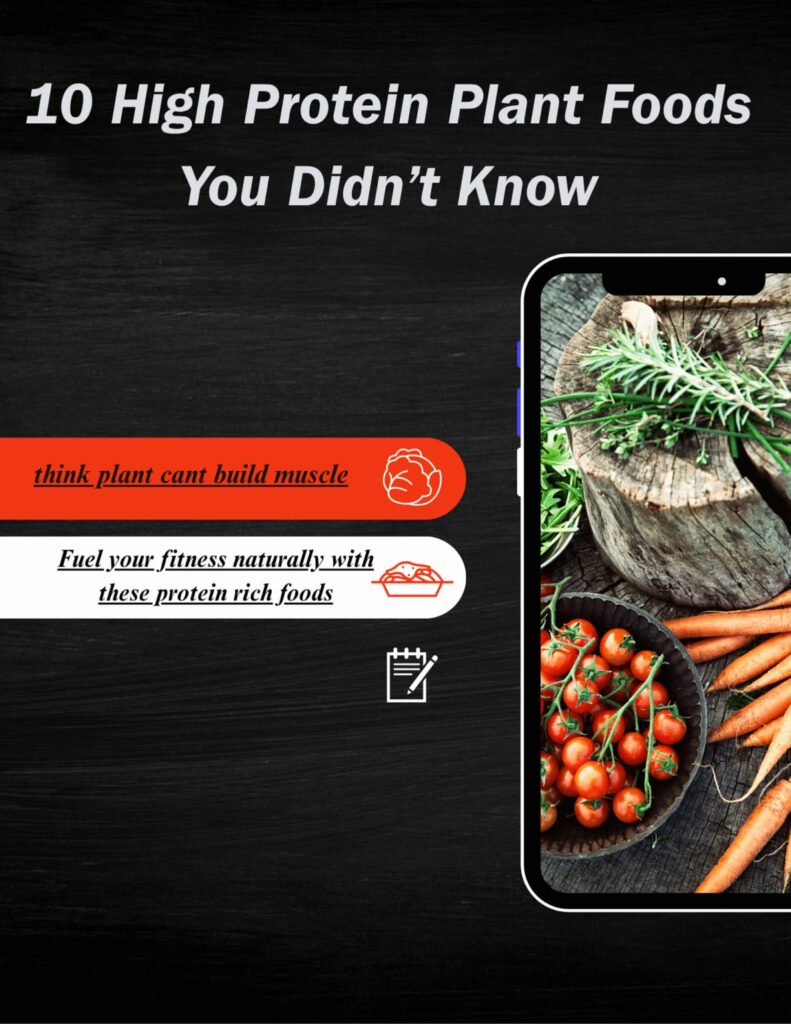10 high protein plant food you didn’t known about

Can you truly get enough protein from plants? Many people doubt it, assuming only meat or whey can build muscle. But the reality is, plants can fuel your body just as effectively—and in a cleaner, healthier way. From lentils and soy to quinoa and hemp, nature provides high-protein foods packed with fiber, antioxidants, and zero cholesterol. Even athletes and MMA fighters are embracing plant-based diets for enhanced strength and faster recovery. If you believe plant protein falls short, this list will change your perspective. Let’s dive into 10 high-protein plant foods you may not know about that can help you stay strong, lean, and energized.

VITAL WHEAT GLUTEN
Produced by thoroughly washing wheat flour to remove most of the starch, this product consists almost entirely of gluten protein. It is commonly used to make seitan, a popular dense and chewy meat substitute favored by vegetarians and vegans. With about 75 grams of protein per 100 grams, it offers an excellent high-protein plant-based alternative to meat.
SPIRULINA
This blue-green algae is a potent superfood renowned for its exceptional protein density. Just two tablespoons provide an impressive 8 grams of complete protein, containing all the essential amino acids your body requires. Beyond its rich protein content, it also supplies substantial amounts of vital nutrients like iron, copper, and a wide array of B vitamins, making it a highly nutritious addition to any diet.
NUTRITIONAL YEAST
Nutritional yeast is a deactivated yeast celebrated for its unique cheesy and nutty flavor. It is an excellent, versatile source of protein and vitamin B12, making it especially beneficial for vegans and vegetarians. With about 8 grams of protein per 1/4 cup serving, it offers a significant nutritional boost while enhancing the savory flavor of many dishes.
HULLED HEMP SEEDS
With a delicate, mild, and subtly nutty flavor, these highly versatile seeds can be effortlessly sprinkled on a range of dishes, including fresh salads, warm cereals, or creamy yogurt, to enhance nutrition. Just three tablespoons of hulled hemp seeds deliver about 10 grams of complete protein, making them a superb source of essential amino acids for a well-rounded diet.
SPROUTED WATERMELON SEEDS
Sprouting watermelon seeds greatly boosts their protein content, making them a highly nutritious and valuable food choice. A 100-gram serving of sprouted seeds provides nearly 36 grams of protein, offering a significant amount of this essential nutrient to support your daily dietary requirements. This impressive protein increase makes sprouted watermelon seeds an excellent natural option for those seeking to enhance and diversify their protein intake healthfully.
TEFF
One of the smallest grains in the world, teff delivers an impressive 10 grams of protein per cooked cup, making it an exceptionally nutritious addition to many diets. This ancient, naturally gluten-free grain is also an excellent source of dietary fiber, essential magnesium, and important iron. Together, these nutrients promote a balanced, wholesome diet that supports overall health and well-being.
KAMUT
Kamut is an ancient grain that is closely related to wheat and is widely recognized for its distinctively chewy texture and rich, nutty flavor, which truly sets it apart from many other common grains. When properly cooked, just one cup of kamut provides nearly 10 grams of protein, a value that is significantly higher than the protein content typically found in regular wheat. This makes kamut not only a nutritious option but also a flavorful and wholesome choice for individuals who are looking to increase their protein intake in a delicious and natural way.
MUNG BEANS
These small green legumes might be tiny in size, but they deliver an impressive nutritional punch, offering more than 14 grams of protein in just one cooked cup. In addition to their high protein content, they are an excellent source of essential nutrients such as folate, dietary fiber, and potassium, all of which contribute to a balanced and healthy diet. These versatile legumes are commonly incorporated into a variety of traditional dishes, including flavorful curries, hearty soups, and many other regional recipes that highlight their rich taste and nutritional benefits.
CHICKPEA PASTA
For those seeking a higher-protein alternative to traditional pasta, chickpea pasta is an excellent choice, containing more than 14 grams of protein and 8 grams of fiber in each serving. In addition to its impressive nutritional profile, chickpea pasta provides a gluten-free option, making it ideal for individuals with gluten sensitivities or celiac disease who need to avoid wheat-based products. This combination of high protein, fiber, and gluten-free benefits makes chickpea pasta a nutritious and versatile option for a variety of dietary preferences and needs.
GUAVA
While fruit is generally not widely recognized or considered a significant source of protein in most diets, guava stands out as a remarkable and noteworthy exception to this common perception. One cup of this delicious and juicy tropical fruit provides an impressive 4 grams of protein, making it a valuable and nutritious addition to your daily diet. In addition to its notable protein content, guava is also packed with a generous amount of vitamin C, which greatly contributes to its overall nutritional benefits and makes it an excellent choice for naturally boosting and supporting your immune system.
No responses yet